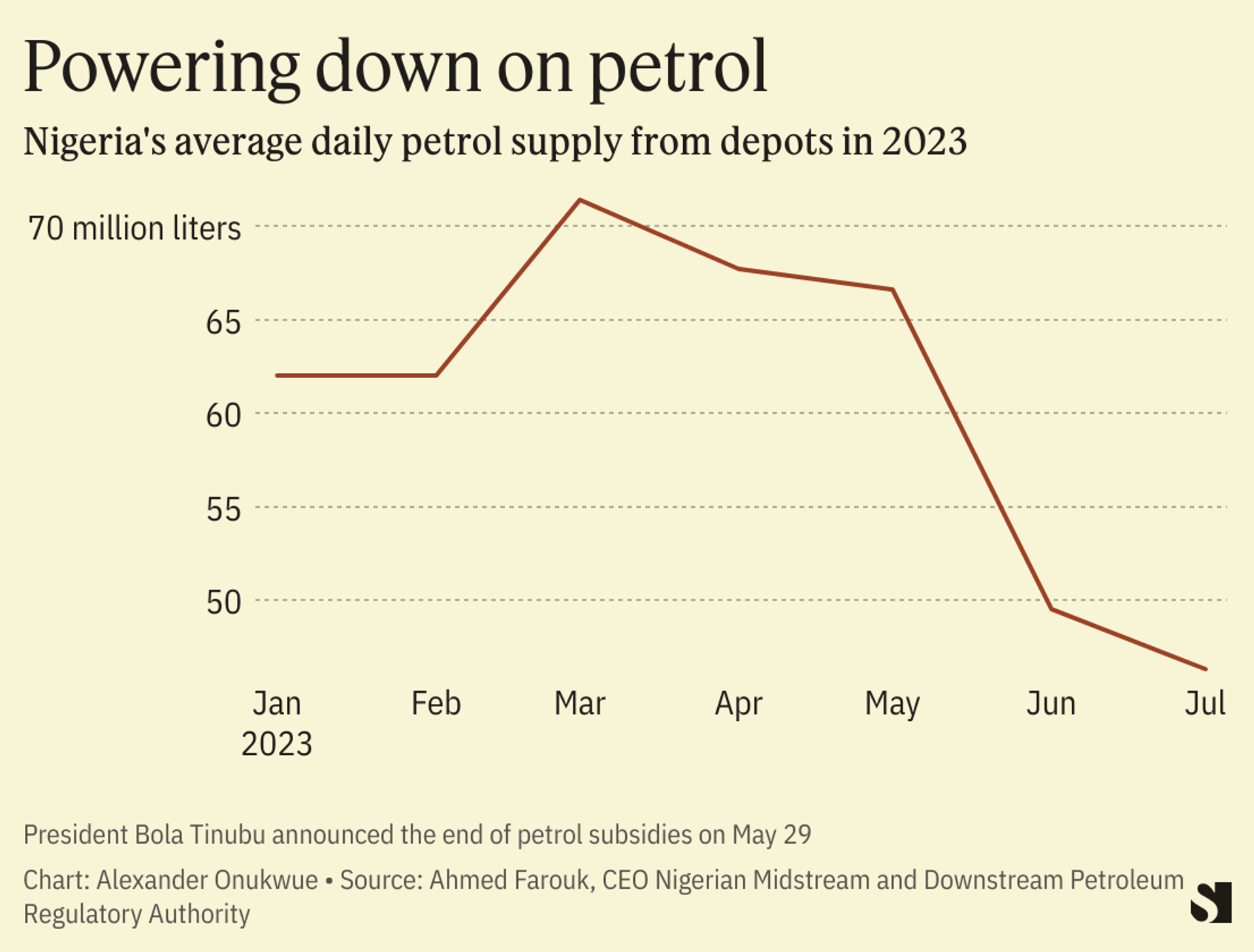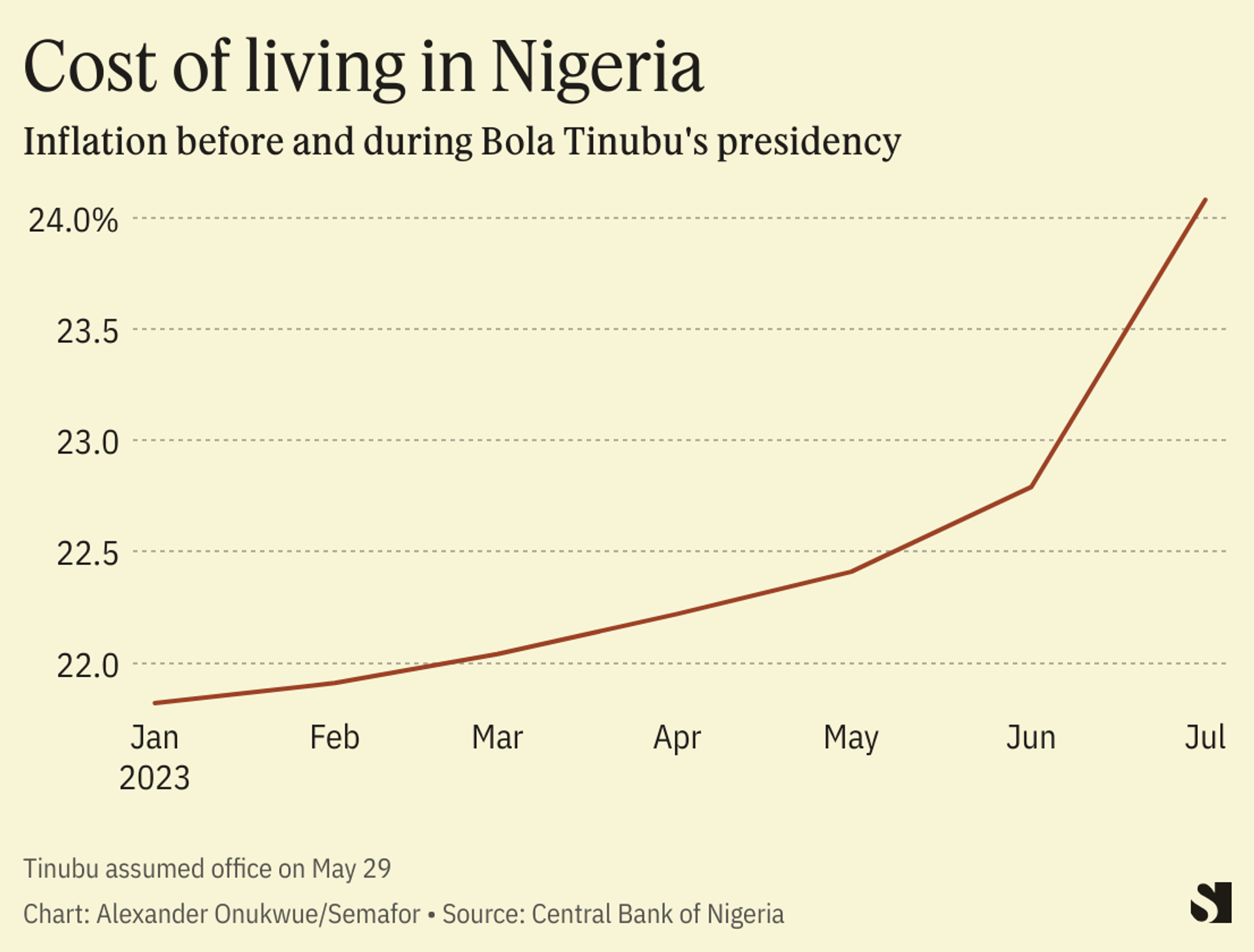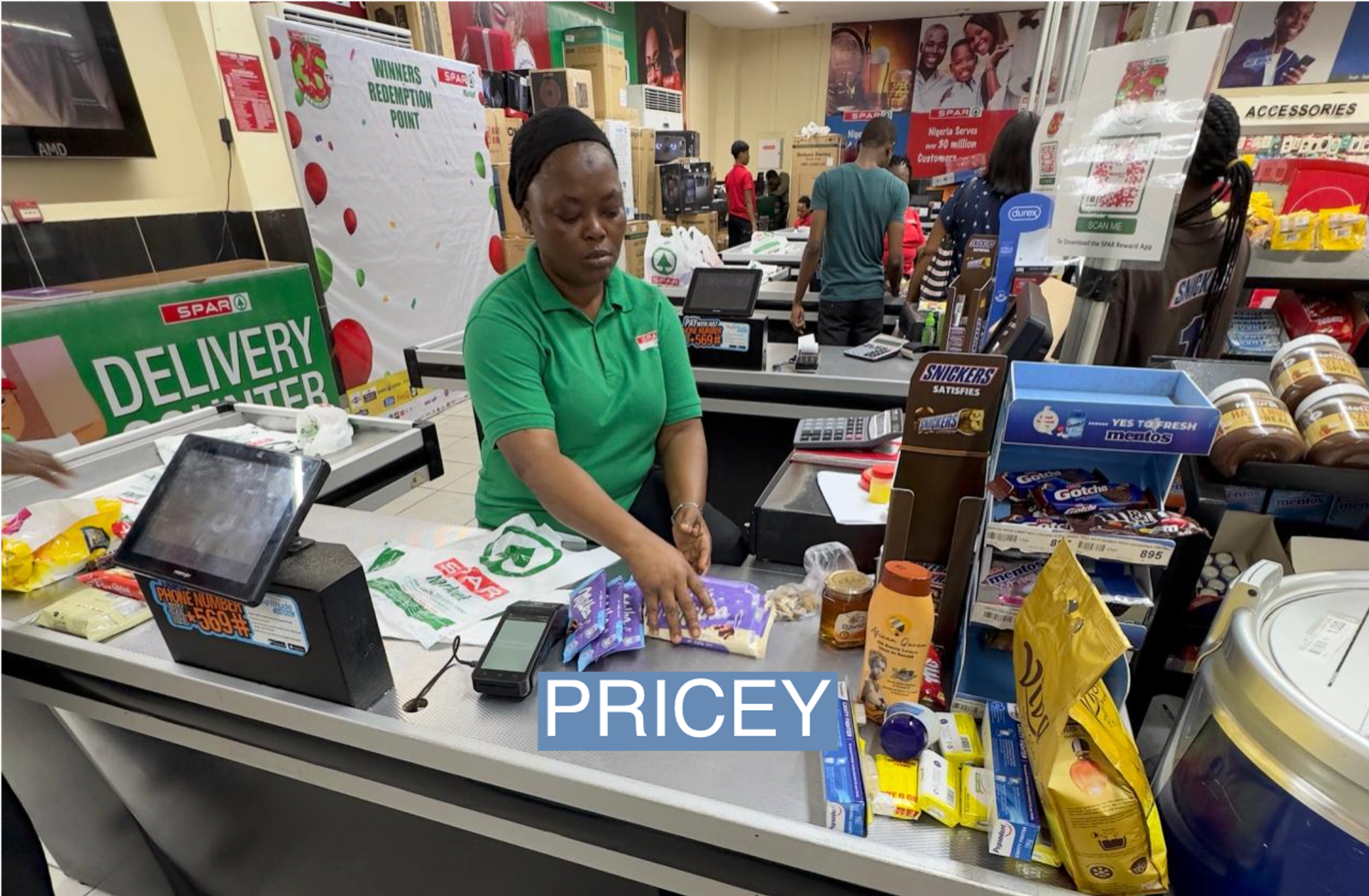The Facts
LAGOS — Bola Tinubu’s first 100 days as Nigeria’s president have been marked by rapid reforms that he has said are necessary for the country’s long-term health. Key among those was the removal of a years-long petrol subsidy that cost $10 billion in 2022, according to the country’s formerly state-owned oil company. He announced the move when he was sworn in on May 29. Tinubu’s decision to allow the Nigerian naira to float freely against the dollar by scrapping a system of multiple exchange rates has also had immediate effects on Africa’s largest economy.
On the international scene, Tinubu assumed leadership of the Economic Community of West African States (Ecowas). He has been the face of the bloc’s tense negotiations with the military junta in Niger which dislodged President Mohamed Bazoum on July 26. This has included him raising the prospect of military intervention should diplomatic efforts fail to reinstate Bazoum.
Know More
→ How do Nigerians feel about losing the petrol subsidy?
Tinubu ended the petrol subsidy so that savings from the scheme, which he said “only benefitted fraudsters and smugglers,” would be directed to social services including public transportation, healthcare and education. He said Nigeria saved one trillion naira ($1.3 billion) between June and July by ending the subsidy.
But petrol prices have tripled across Nigeria due to the move, driving up costs in nearly every sector of the economy. “There is no increase in salary but everything has skyrocketed,” said Latunji Korede, 30, a marketer at a healthcare company, complaining that some of his food costs have doubled. Blessing, a 20-year-old attendant at a cold juice shop in the Surulere district of Lagos, pointed to a dust-covered generator that her boss no longer uses because petrol is too expensive. Residents in Abuja and Port Harcourt that Semafor Africa spoke to on the phone also described this rationing process.

Remedies for these pains have not come quickly. Tinubu received the Nigerian Senate’s approval to borrow $800 million from the World Bank to provide short-term relief — usually called ‘palliatives’ in Nigeria — but has put off a proposed monthly cash transfer of 8,000 naira (~$10) to 12 million households after it was widely criticized for being too small. About 40% of people in the country of 220 million people live below the international poverty line of $1.90 per day, according to the nation’s statistics office.
→ How has the naira free float worked out?
Many of Nigeria’s largest businesses — from cement producer Dangote to Africa’s largest telecommunications provider MTN, online retailer Jumia and early-stage tech startups — have said the rapid devaluation of the naira that followed the end of a fixed official rate has eaten into earnings and increased operation costs. Unofficial or black market rates for buying the dollar outside banking halls are still 20% above what the central bank publishes as market value.

The situation hasn’t been helped with a 40% drop off in oil production over the last two years by a beleaguered sector struggling with vandalism and theft. It means Nigeria, traditionally Africa’s largest crude oil producer, has been earning far less in dollar revenues from its primary export.
The combination of a weakened currency, which has pushed up importation costs, and the removal of the fuel subsidy has driven inflation. Food prices in particular have skyrocketed, which prompted Nigeria’s government to declare a state of emergency on food security in July.

→ How has Tinubu performed on the international stage?
In his acceptance speech after being elected Ecowas chair on July 10, Tinubu sent out a zero-tolerance warning against further coups in West Africa. It took just 16 days for soldiers in Niger to test that resolve and nothing has changed since a seven-day ultimatum issued four days later by Tinubu’s Ecowas elapsed. Ecowas has held one other emergency meeting in Abuja in the period since with Tinubu in attendance.
But the Nigeria president has largely delegated follow-up diplomatic and mediation efforts to emissaries, mostly former senior government officials and religious leaders from Nigeria’s muslim north whose communities border Niger and for whom a potential conflict would be most serious.
Tinubu has remained in Nigeria since the Niger coup, overseeing the swearing-in of his 48 ministers and cabinet meetings. A first trip away would be to India for a business session during the G-20 summit at the invitation of the prime minister Narendra Modi. Tinubu is expected to attend the UN General Assembly meeting in New York next week where he will meet U.S. president Joe Biden.
→ What else does Tinubu have to worry about?
Judgments in suits challenging Tinubu’s victory in the February polls by his two main rivals, Atiku Abubakar and Peter Obi, will be delivered on live television on Wednesday (Sept. 6), a registrar for the elections tribunal in Nigeria’s capital Abuja said in a statement. The tribunal has been hearing arguments since challenges to the outcome of February’s presidential election were filed in March. Major contentions include concerns over the way in which results were transmitted and the interpretation of a constitutional requirement for the winning candidate to secure two-thirds of votes in Nigeria’s 36 states and its federal capital territory. No Nigerian president has ever had his election overturned by a court. The decision can be appealed at Nigeria’s supreme court.
Meanwhile, the internal security issues Tinubu inherited from his predecessor Muhammadu Buhari remain a concern. Kidnapping for ransom increased 6% over the past year and Islamist insurgent group Boko Haram still carries out abductions of women in the northeast.
Separatists in the southeast under the Indigenous People of Biafra group have continued to enforce a widely observed sit-at-home campaign, shutting businesses on Mondays, in protest at their leader Nnamdi Kanu still being held in the Nigerian government’s custody despite an appeal court last year ruling that his extradition to face terror and treason charges was illegal.
